Specialised early intervention teams (extended time) for recent-onset psychosis
- PMID: 33135812
- PMCID: PMC8094422
- DOI: 10.1002/14651858.CD013287.pub2
Specialised early intervention teams (extended time) for recent-onset psychosis
Abstract
Background: Psychosis is an illness characterised by the presence of hallucinations and delusions that can cause distress or a marked change in an individual's behaviour (e.g. social withdrawal, flat or blunted effect). A first episode of psychosis (FEP) is the first time someone experiences these symptoms that can occur at any age, but the condition is most common in late adolescence and early adulthood. This review is concerned with FEP and the early stages of a psychosis, referred to throughout this review as 'recent-onset psychosis.' Specialised early intervention (SEI) teams are community mental health teams that specifically treat people who are experiencing, or have experienced, a recent-onset psychosis. SEI teams provide a range of treatments including medication, psychotherapy, psychoeducation, educational and employment support, augmented by assertive contact with the service user and small caseloads. Treatment is time limited, usually offered for two to three years, after which service users are either discharged to primary care or transferred to a standard adult community mental health team. Evidence suggests that once SEI treatment ends, improvements may not be sustained, bringing uncertainty about the optimal duration of SEI to ensure the best long-term outcomes. Extending SEI has been proposed as a way of providing continued intensive treatment and continuity of care, of usually up to five years, in order to a) sustain the positive initial outcomes of SEI; and b) improve the long-term trajectory of the illness.
Objectives: To compare extended SEI teams with treatment as usual (TAU) for people with recent-onset psychosis. To compare extended SEI teams with standard SEI teams followed by TAU (standard SEI + TAU) for people with recent-onset psychosis.
Search methods: On 3 October 2018 and 22 October 2019, we searched Cochrane Schizophrenia's study-based register of trials, including registries of clinical trials.
Selection criteria: We selected all randomised controlled trials (RCTs) comparing extended SEI with TAU for people with recent-onset psychosis and all RCTs comparing extended SEI with standard SEI + TAU for people with recent-onset psychosis. We entered trials meeting these criteria and reporting usable data as included studies.
Data collection and analysis: We independently inspected citations, selected studies, extracted data and appraised study quality. For binary outcomes we calculated the risk ratios (RRs) and their 95% confidence intervals (CIs). For continuous outcomes we calculated the mean difference (MD) and their 95% CIs, or if assessment measures differed for the same construct, we calculated the standardised mean difference (SMD) with 95% CIs. We assessed risk of bias for included studies and created a 'Summary of findings' table using the GRADE approach.
Main results: We included three RCTs, with a total 780 participants, aged 16 to 35 years. All participants met the criteria for schizophrenia spectrum disorders or affective psychoses. No trials compared extended SEI with TAU. All three trials randomly allocated people approximately two years into standard SEI to either extended SEI or standard SEI + TAU. The certainty of evidence for outcomes varied from low to very low. Our primary outcomes were recovery and disengagement from mental health services. No trials reported on recovery, and we used remission as a proxy. Three trials reported on remission, with the point estimate suggesting a 13% increase in remission in favour of extended SEI, but this included wide confidence intervals (CIs) and a very uncertain estimate of no benefit (RR 1.13, 95% CI 0.97 to 1.31; 3 trials, 780 participants; very low-certainty evidence). Two trials provided data on disengagement from services with evidence that extended SEI care may result in fewer disengagements from mental health treatment (15%) in comparison to standard SEI + TAU (34%) (RR 0.45, 95% CI 0.27 to 0.75; 2 trials, 380 participants; low-certainty evidence). There may be no evidence of a difference in rates of psychiatric hospital admission (RR 1.55, 95% CI 0.68 to 3.52; 1 trial, 160 participants; low-certainty evidence), or the number of days spent in a psychiatric hospital (MD -2.70, 95% CI -8.30 to 2.90; 1 trial, 400 participants; low-certainty evidence). One trial found uncertain evidence regarding lower global psychotic symptoms in extended SEI in comparison to standard SEI + TAU (MD -1.90, 95% CI -3.28 to -0.52; 1 trial, 156 participants; very low-certainty evidence). It was uncertain whether the use of extended SEI over standard SEI + TAU resulted in fewer deaths due to all-cause mortality, as so few deaths were recorded in trials (RR 0.38, 95% CI 0.09 to 1.64; 3 trials, 780 participants; low-certainty evidence). Very uncertain evidence suggests that using extended SEI instead of standard SEI + TAU may not improve global functioning (SMD 0.23, 95% CI -0.29 to 0.76; 2 trials, 560 participants; very low-certainty evidence). There was low risk of bias in all three trials for random sequence generation, allocation concealment and other biases. All three trials had high risk of bias for blinding of participants and personnel due to the nature of the intervention. For the risk of bias for blinding of outcome assessments and incomplete outcome data there was at least one trial with high or unclear risk of bias.
Authors' conclusions: There may be preliminary evidence of benefit from extending SEI team care for treating people experiencing psychosis, with fewer people disengaging from mental health services. Evidence regarding other outcomes was uncertain. The certainty of evidence for the measured outcomes was low or very low. Further, suitably powered studies that use a consistent approach to outcome selection are needed, but with only one further ongoing trial, there is unlikely to be any definitive conclusion for the effectiveness of extended SEI for at least the next few years.
Trial registration: ClinicalTrials.gov NCT00914238.
Copyright © 2020 The Cochrane Collaboration. Published by John Wiley & Sons, Ltd.
Conflict of interest statement
Stephen Puntis: SP currently receives research grants for the purpose of investigating the effectiveness of early intervention in psychosis services
Amedeo Minichino: AM currently receives Medical Research Council Funding for a DPhil studentship
Franco De Crescenzo: none
Rachael Harrison: none
Andrea Cipriani: Andrea Cipriani has received research grants and consultancy fees from INCiPiT (Italian Network for Paediatric Trials), CARIPLO Foundation and Angelini Pharma, outside the submitted work.
Belinda Lennox: I work clinically in an early intervention in psychosis service, and am clinical lead for early intervention in psychosis for NHS England. I am an investigator on a pending NIHR HTA award examining extended Early Intervention services. I have received travel expenses from Lundbeck and Alkermes, fees for consultancy work for Astellas, and share income from GlaxoSmithKline, all outside the submitted work. No other declarations of interest.
Figures
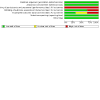
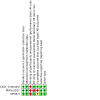
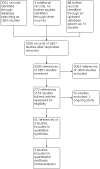
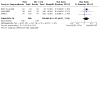
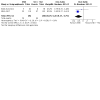

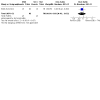
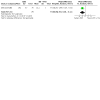
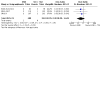
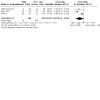

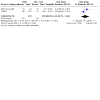

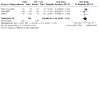
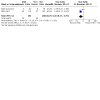
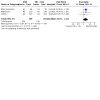
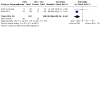
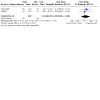
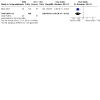



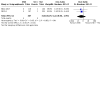
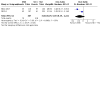

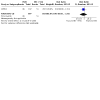
Update of
- doi: 10.1002/14651858.CD013287
Similar articles
-
Specialised early intervention teams for recent-onset psychosis.Cochrane Database Syst Rev. 2020 Nov 2;11(11):CD013288. doi: 10.1002/14651858.CD013288.pub2. Cochrane Database Syst Rev. 2020. PMID: 33135811 Free PMC article.
-
Folic acid supplementation and malaria susceptibility and severity among people taking antifolate antimalarial drugs in endemic areas.Cochrane Database Syst Rev. 2022 Feb 1;2(2022):CD014217. doi: 10.1002/14651858.CD014217. Cochrane Database Syst Rev. 2022. PMID: 36321557 Free PMC article.
-
Psychological interventions for psychosis in adolescents.Cochrane Database Syst Rev. 2020 Jul 3;7(7):CD009533. doi: 10.1002/14651858.CD009533.pub2. Cochrane Database Syst Rev. 2020. PMID: 32633858 Free PMC article.
-
Collaborative care approaches for people with severe mental illness.Cochrane Database Syst Rev. 2024 May 7;5(5):CD009531. doi: 10.1002/14651858.CD009531.pub3. Cochrane Database Syst Rev. 2024. PMID: 38712709 Free PMC article. Review.
-
Avatar Therapy for people with schizophrenia or related disorders.Cochrane Database Syst Rev. 2020 May 8;5(5):CD011898. doi: 10.1002/14651858.CD011898.pub2. Cochrane Database Syst Rev. 2020. PMID: 32413166 Free PMC article.
Cited by
-
The gut microbiome is associated with brain structure and function in schizophrenia.Sci Rep. 2021 May 7;11(1):9743. doi: 10.1038/s41598-021-89166-8. Sci Rep. 2021. PMID: 33963227 Free PMC article. Clinical Trial.
-
Predictors of positive patient-reported outcomes from 'Early Intervention in Psychosis': a national cross-sectional study.BMJ Ment Health. 2023 Aug;26(1):e300716. doi: 10.1136/bmjment-2023-300716. BMJ Ment Health. 2023. PMID: 37541700 Free PMC article.
-
Neglecting the care of people with schizophrenia: here we go again.Psychol Med. 2023 Feb 20;53(4):1-6. doi: 10.1017/S0033291723000247. Online ahead of print. Psychol Med. 2023. PMID: 36804942 Free PMC article. Review.
-
Assessing violence risk in first-episode psychosis: external validation, updating and net benefit of a prediction tool (OxMIV).BMJ Ment Health. 2023 Jun;26(1):e300634. doi: 10.1136/bmjment-2022-300634. BMJ Ment Health. 2023. PMID: 37316256 Free PMC article.
-
Psychological Interventions for Young People With Psychotic Disorders: A Systematic Review.Front Psychiatry. 2022 Mar 24;13:859042. doi: 10.3389/fpsyt.2022.859042. eCollection 2022. Front Psychiatry. 2022. PMID: 35401253 Free PMC article.
References
References to studies included in this review
EASY_Extended {published data only}ICRCTN1188976
-
- Chan GH, Jim OT, AuYang CW, Hui CL, Wong GH, Lam MM, et al. Effects of extended case management on functioning in people with early psychosis-preliminary findings of the EASY3 randomised controlled study. Schizophrenia Research 2012;136:S176.
-
- Chang WC, Chan GH, Jim OT, Lau ES, Hui CL, Chan SK, et al. Optimal duration of an early intervention programme for first-episode psychosis: randomised controlled trial. British Journal of Psychiatry 2015;206(6):492-500. - PubMed
-
- Chang WC, Chan HK, Jim TT, Wong HY, Hui LM, Chan KW, et al. Randomized controlled trial evaluating 1-year extended case management for first-episode psychosis patients discharged from EASY program in Hong Kong. Schizophrenia Bulletin 2013;39:S324-5.
-
- Chang WC, Kwong VW, Chan GH, Jim OT, Lau ES, Hui CL, et al. Prediction of functional remission in first-episode psychosis: 12-month follow-up of the randomized-controlled trial on extended early intervention in Hong Kong. Schizophrenia Research 2016;173:79-83. - PubMed
-
- Chang WC, Kwong VW, Chan GH, Jim OT, Lau ES, Hui CL, et al. Prediction of motivational impairment: 12-month follow-up of the randomized-controlled trial on extended early intervention for first-episode psychosis. European Psychiatry 2017;41:37-41. - PubMed
Malla 2017 {published data only}
-
- Albert N, Melau M, Jensen H, Hastrup LH, Hjorthoj C, Nordentoft M. When should early intervention start, and for how long should it last? Schizophrenia Bulletin 2018;44(Suppl 1):S129.
-
- ISRCTN11889976. Comparison between extension of specialised early intervention for first episode psychosis and regular care: a randomised controlled trial. www.isrctn.com/ISRCTN11889976 (first received 20 March 2009).
-
- Lutgens D, Joober R, Iyer S, Lepage M, Norman R, Schmitz N, et al. Progress of negative symptoms over the initial 5 years of a first episode of psychosis. Psychological Medicine 2019;49(1):66-74. - PubMed
-
- Lutgens D, Joober R, Iyer S, Lepage M, Norman R, Schmitz N, et al. Progress of negative symptoms over the initial 5 years of a first episode of psychosis - CORRIGENDUM. Psychological Medicine 2018;48(11):1921-3. - PubMed
OPUS II {published data only}
-
- Albert N, Glenthoj LB, Melau M, Jensen H, Hjorthoj C, Nordentoft M. Course of illness in a sample of patients diagnosed with a schizotypal disorder and treated in a specialized early intervention setting. Findings from the 3.5year follow-up of the OPUS II study. Schizophrenia Research 2017;182:24-30. - PubMed
-
- Albert N, Melau M, Jensen H, Emborg C, Jepsen JR, Fagerlund B, et al. Five years of specialised early intervention versus two years of specialised early intervention followed by three years of standard treatment for patients with a first episode psychosis: randomised, superiority, parallel group trial in Denmark (OPUS II). BMJ 2017;356:i6681. [DOI: 10.1136/bmj.i6681] - DOI - PMC - PubMed
-
- Anonymous. Five years of specialised early intervention versus two years of specialised early intervention followed by three years of standard treatment for patients with a first episode psychosis: randomised, superiority, parallel group trial in Denmark (OPUS II). BMJ 2017;356:j1015. [DOI: 10.1136/bmj.j1015] - DOI - PMC - PubMed
References to studies excluded from this review
Alaghband‐Rad 2006 {published data only}
-
- Alaghband-Rad J, Shahrivar Z, Mahmoodi J, Salesian N. First episode psychoses among Iranian adolescents. Schizophrenia Research 2006;86(Suppl 1):S65.
-
- Alaghband-Rad J, Shahrivar Z, Mahmoudi-gharaei J, Sharifi V, Amini H, et al. Integrated vs usual treatment model in first episode - psychosis among Iranian adolescents. Early Intervention in Psychiatry 2008;2(Suppl 1):A92.
-
- Alaghband-Rad J, Sharifi V, Amini H, Shahrivar Z, Mottaghipour Y, et al. Management of first episode psychoses in Iran: unique features and challenges. Schizophrenia Research 2006;86(Suppl 1):S42.
Cai 2013 {published data only}
-
- Cai C. Comparison of different treatment methods affect the quality of life of patients with first-episode schizophrenia. Journal of Medical Theory and Practice 2013;26(3):341-2.
Carpenter 1982 {published data only}
-
- Carpenter W, Stephen J, Rey A. Early intervention vs. continuous pharmacotherapy of schizophrenia. Psychopharmacology Bulletin 1982;18(1):21-3.
Cechnicki 2017 {published data only}
-
- Cechnicki A, Bielanska A. The influence of early psychosocial intervention on the long-term clinical outcomes of people suffering from schizophrenia. Psychiatria Polska 2017;51(1):45-61. - PubMed
Chen 2013 {published data only}
-
- Chen L. Application of comprehensive nursing intervention in first-episode schizophrenia patients. China Contemporary Medicine 2013;7(20):156-7.
COAST 2004 {published data only}
-
- Kuipers E, Holloway F, Rabe-Hesketh S, Tennakoon L. An RCT of early intervention in psychosis: Croydon Outreach and Assertive Support Team (COAST). Social Psychiatry and Psychiatric Epidemiology 2004;39(5):358-63. [MEDLINE: ] - PubMed
Dai 2007 {published data only}
-
- Dai M, Liu F, Fan J. A study on influence of early comprehensive interventions on prognosis of incipient schizophrenia patients. Chinese Nursing Research 2007;21(9B):2393-4.
Fan 2005c {published data only}
-
- Fan X-H. The effects of community nursing intervention on the recovery of patients with primary schizophrenia. Journal of the Linyi Medical College 2005;27(6):419-21.
GET UP PIANO 2013 {published data only}
-
- Lasalvia A, Bonetto C, Lenzi J, Rucci P, Iozzino L, Cellini M, et al. Predictors and moderators of treatment outcome in patients receiving multi-element psychosocial intervention for early psychosis: results from the GET UP pragmatic cluster randomised controlled trial. British Journal of Psychiatry 2017;210(5):342-9. - PubMed
-
- Lenzi J, Iozzino L, De Girolamo G, Rucci P, Tosato S, Lasalvia A, et al. Predictors of 9-month hospitalization in patients with first-episode affective and non-affective psychosis. Results from the GET UP pragmatic cluster randomized controlled trial. Schizophrenia Research 2017;190:187-8. - PubMed
-
- NCT01436331. A large pragmatic cluster randomized controlled trial of a multi-element psychosocial intervention for early psychosis. ClinicalTrials.gov/show/NCT01436331 (first received 19 September 2011).
-
- Ruggeri M, Bonetto C, Lasalvia A, De Girolamo G, Fioritti A, Rucci P, et al. A multi-element psychosocial intervention for early psychosis (get up piano trial) conducted in a catchment area of 10 million inhabitants: Study protocol for a pragmatic cluster randomized controlled trial. Trials 2012;13(1):73. [MEDLINE: ] - PMC - PubMed
-
- Ruggeri M, Bonetto C, Lasalvia A, Fioritti A, Girolamo G, Santonastaso P, et al. Feasibility and effectiveness of a multi-element psychosocial intervention for first-episode psychosis: results from the cluster-randomized controlled GET UP PIANO trial in a catchment area of 10 million inhabitants. Schizophrenia Bulletin 2015;41(5):1192-203. - PMC - PubMed
Hansen 2012 {published data only}
-
- Hansen JP, Ostergaard B, Nordentoft M, Hounsgaard L. Cognitive adaptation training combined with assertive community treatment: A randomised longitudinal trial. Schizophrenia Research 2012;135(1-3):105-11. - PubMed
-
- Hansen JP , Ostergaard B , Nordentoft M, Hounsgaard L. Cognitive adaptation training in an assertive community treatment setting for outpatients with schizophrenia. European Psychiatry 2013;28(Suppl 1):1.
-
- Hansen JP, Ostergaard B, Nordentoft M, Hounsgaard L. The feasibility of cognitive adaptation training for outpatients with schizophrenia in integrated treatment. Community Mental Health Journal 2013;49(6):630-5. - PubMed
Hou 2007 {published data only}
-
- Hou D-Q , Zeng Z-X, Wang H-Y. Effect of insight education and self-confidence training on the quality of life and well-being rating in first episode schizophrenia. Chinese Journal of Rehabilitation Theory and Practice 2007;13(5):479-81.
ISRCTN58681229 {published data only}58681229
-
- ISRCTN58681229. Cluster randomised trial comparing outcomes of early psychosis care by a specialist team and augmented community mental health teams (CMHTs). www.isrctn.com/ISRCTN58681229 (first received 31 January 2005).
-
- Johnson S, Hinton M, Pilling S, Bebbington P, Hobbs L, Cohen S. Strategies for implementation of early intervention for psychosis in a catchment area mental health system: A mixed methods comparison. Psychiatrische Praxis 2011;38:OP15_EC.
J‐CAP 2014 {published data only}
-
- Ando S, Nishida A, Koike S, Yamasaki S, Maegawa S, Ichihashi K, et al. Comprehensive early intervention for patients with first-episode psychosis in Japan (J-CAP): nine-month follow-up of randomized controlled trial. Early Intervention in Psychiatry 2014;8:82.
-
- Nishida A, Ando S, Yamasaki S, Koike S, Ichihashi K, Miyakoshi Y, et al. A randomized controlled trial of comprehensive early intervention care in patients with first-episode psychosis in Japan: 1.5-year outcomes from the J-CAP study. Journal of Psychiatric Research 2018;102:136-41. - PubMed
LEO {published data only}
-
- Gafoor R, Nitsch D, Craig T, Garety P, Power P, McGuire P. Does Early Intervention (EI) in schizophrenia improve long term outcome? Results from 5 year follow-up study (South London Interventions in First Episode psychosis - LIFE). Early Intervention in Psychiatry 2008;2(Suppl 1):A51.
-
- Gafoor R, Nitsch D, McCrone P, Craig TK, Garety PA, Power P, et al. Effect of early intervention on 5-year outcome in non-affective psychosis. British Journal of Psychiatry 2010;196(5):372-6. - PubMed
LEO‐CAT 2004 {published data only}
-
- Power P, Craig TK, Mcguire P, Iacoponi E, Garety P, Russell M. A randomised controlled trial of an early detection team in first episode psychosis: the LEO-CAT trial. Schizophrenia Research 2004;67(1):36.
-
- Power P, Iacoponi E, Reynolds N, Fisher H, Russell M, Garety P, et al. The Lambeth Early Onset Crisis Assessment Team Study: general practitioner education and access to an early detection team in first-episode psychosis. British Journal of Psychiatry. Supplements 2007;191(Suppl 51):s133-9. [MEDLINE: ] - PubMed
-
- Power P, Iacoponi E, Russell M, Fisher H, Mcguire P, Garety P, et al. A randomised controlled trial of an early detection team in first- episode psychosis: provisional findings of the LEO CAT study. Schizophrenia Research 2004;70(1):131.
-
- Power P, Monteiro E, Pobee I, Burnside A, Pugh C, Reynolds N, et al. 18 months outcome of first episode psychosis patients attending the LEO service in south London. Early Intervention in Psychiatry 2008;2(Suppl 1):A6.
Li 2012a {published data only}
-
- Li C, Zhang S, Cao H. Application of clinical nursing pathways in the nursing of first-time hospitalized patients with schizophrenia. Chinese Journal of Modern Medicine 2012;6(14):113-5.
Li 2012b {published data only}
-
- Li Z. Influence of first-episode schizophrenia cognitive function by prevention and treatment of community comprehensive measures. China Contemporary Medicine 2012;19(33):164-5.
Linszen 1994 {published data only}
-
- Lenior ME, Dingemans PM, Schene AH, Hart AA, Linszen DH. The course of parental expressed emotion and psychotic episodes after family intervention in recent-onset schizophrenia. A longitudinal study. Schizophrenia Research 2002;2:183-90. - PubMed
-
- Linszen D, Dingemans P, Lenior M. Early intervention and a five year follow up in young adults with a short duration of untreated psychosis: ethical implications. Schizophrenia Research 2001;51(1):55-61. - PubMed
-
- Linszen D , Dingemans P , Scholte W , Lenior M, Goldstein M. Early recognition, intensive intervention and other protective and risk factors for psychotic relapse in patients with first psychotic episodes in schizophrenia. International Clinical Psychopharmacology 1998;13(Suppl 1):S7-S12. - PubMed
-
- Linszen D , Dingemans P , Van der Does JW , Nugter A , Scholte P, et al. Treatment, expressed emotion and relapse in recent onset schizophrenic disorders. Psychological Medicine 1996;26(2):333-42. - PubMed
-
- Linszen D , Dingemans PM , Lenior ME , Scholte WF, Goldstein M. Early family and individual interventions and relapse in recent-onset schizophrenia and related disorders. Italian Journal of Psychiatry and Behavioural Sciences 1998;8:77-84.
Linszen 2002 {published data only}
-
- Linszen DH, Dingemans PM. Early intervention in recent onset schizophrenia preliminary results. In: Proceedings of the 3rd International Conference on Early Psychosis; 2002 Sep 25-28; Copenhagen, Denmark. 2002:13.
-
- Linszen DH, Dingemans PM. Sustained intervention in recent onset schizophrenia: three year results of a controlled clinical trial. Schizophrenia Research 2002;53(3 Suppl 1):14.
Linszen 2003 {published data only}
-
- Linszen D, Wouters L, Dingemans P, De Haan L, Nieman D. Early and 3-year sustained intervention in first episode schizophrenia: relapse, stabilization and its predictors. Schizophrenia Research 2004;67(1):18.
-
- Linszen D. Early and critical period intervention in first episode schizophrenia: relapse, chronicity, early stabilisation, predictors over 4 years and new research. Schizophrenia Research 2004;70(1):66.
-
- Linszen DH, De Haan L, Dingemans P, Van Bruggen M, Hofstra N, Van Engelsdorp H, et al. Treatment reluctance in first episode schizophrenia: lack of insight, non-compliance and cannabis abuse predict bad outcome after eighteen months intervention. Schizophrenia Research 2003;60:325.
Linszen 2006 {published data only}
-
- Linszen D, De Haan L, Dingemans P, Lenior R, Van Amelsvoort T, Wouters L. The Amsterdam critical period intervention in the early phase of schizophrenia-like psychoses. Schizophrenia Research 2006;86(Suppl 1):S61.
Linszen 2007 {published data only}
-
- Linszen D, De Haan L, Wouters L, Dingemans P, Van Amelsvoort T, Lenior M. A five year randomized controlled trial of specialised care and parent groups vs standard care for first episode patients. Schizophrenia Bulletin 2007;33(2):442.
-
- Linszen D, Wouters L, Krikke M, Nieman D, Amelsvoort TV, Lenior M, et al. Continuity of treatment and supporting parent groups in early phase schizophrenia: a 5 year randomised trial. In: Proceedings of the 12th International Congress on Schizophrenia Research; 2009 Mar 28-Apr 1; San Diego, CA. San Diego, CA, USA: Oxford Univ Press, 2009:346.
Liu 2012a {published data only}
-
- Liu M. Curative effect observation on 60 cases of first-episode schizophrenia treated by integrated traditional Chinese and Western medicine. Journal of Guiyang College of Traditional Chinese Medicine 2012;2(24):47-8.
Liu 2012b {published data only}
-
- Liu M, Zhang L, Xie Y, Tang Qu, Jiang C, Lu Q, et al. Study on the rehabilitation effect of community supervision and programmed training on first-episode schizophrenia. Journal of Psychiatry (Chinese) 2012;3:200-3.
Malla 2000 {published data only}
-
- Malla A, Norman R, McLean T, Manchanda R, Townsend L, Cortese L, et al. Development of a community focussed early intervention program for psychosis: combining service, research and public education. In: Proceedings of the 2nd International Conference on Early Psychosis; 2000 Mar 31 - Apr 2; New York, New York, USA. 2000.
NCT01783457 {published data only}
NCT01936220 {published data only}
-
- NCT01936220. Relapse prevention in first episode of schizophrenia and related psychotic disorders: a 5 year randomized controlled trial. Clinicaltrials.gov/show/NCT01936220 (first received 6 September 2013).
NCT02037581 {published data only}
-
- Lambert M, Schottle D, Sengutta M, Ludecke D, Nawara AL, Galling B, et al. Early detection and integrated care in adolescents and young adults with severe psychotic illnesses. Psychiatrische Praxis 2015;42:S49-53. - PubMed
-
- NCT02037581. Integrated care in early psychosis TI - Integrated Care in Early Psychosis (ICEP Study): a 12-month quasi experimental study with historic control group. Clinicaltrials.gov/show/NCT02037581 (first received 8 August 2017).
NCT02751632 {published data only}
-
- ACTRN12616000098437. Staged Treatment in Early Psychosis (STEP): A sequential multistage randomized clinical trial (SMART) of interventions for Ultra High Risk (UHR) of psychosis patients. anzctr.org.au/Trial/Registration/TrialReview.aspx?ACTRN=12616000098437 (first received 22 January 2016).
-
- NCT02751632. The staged treatment in early psychosis study. ClinicalTrials.gov/show/NCT02751632 (first received 26 April 2016).
NCT03409393 {published data only}
-
- NCT03409393. Feasibility and relevance of high-intensity functional training in patients with first-episode psychosis (COPUS). ClinicalTrials.gov/show/NCT03409393 (first received 24 January 2018).
OPUS {published data only}
-
- Øhlenschlæger J, Thorup A, Petersen L, Jeppesen P, Abel M, Nordentoft M. Coercion in first episode psychosis. In: Proceedings of the 3rd International Conference on Early Psychosis; 2002 Sep 25-28; Copenhagen, Denmark. 2002:89-90.
-
- Albert N, Jensen H, Melau M, Hjorthoj C, Nordentoft M. How long should a specialized assertive early intervention program last? Early Intervention in Psychiatry 2014;8:10.
-
- Archie S. Integrated care improves one year outcomes in first episode psychosis. Evidence-Based Mental Health 2006;9(2):46. [MEDLINE: ] - PubMed
-
- Austin S, Seche R, Hagen R, Mors O, Nordentoft M. Remission, metacognitive processes and quality of life-outcomes from opus trial. A 10 year follow-up of a randomized multi-center trial of intensive early intervention vs. standard treatment for patients with first episode schizophrenia spectrum disorder. Schizophrenia Bulletin 2011;37:258.
-
- Austin S, Secher RG, Mors O, Nordentoft M. Course of illness in first-episode psychosis-outcomes from opus trial. Early Intervention in Psychiatry 2012;6:15.
OTP {published data only}
-
- Grawe RW, Falloon IR, Widen JH, Skogvoll E. Two years of continued early treatment for recent-onset schizophrenia: a randomised controlled study. Acta Psychiatrica Scandinavica 2006;114(5):328-36. [MEDLINE: ] - PubMed
-
- Grawe RW, Widen JH. Result of two years optimal out-patient treatment of first episode schizophrenia: a controlled study. Nordisk Psykiatrisk Tidsskrift 1998;52(41):76.
-
- Morken G, Grawe RW, Widen JH. A randomized controlled trial in recent-onset schizophrenia. Effects on compliance of two years of continued intervention. European Neuropsychopharmacology 2005;15(Suppl 3):S521.
-
- Morken G, Grawe RW, Widen JH. Effects of integrated treatment on antipsychotic medication adherence in a randomized trial in recent-onset schizophrenia. Journal of Clinical Psychiatry 2007;68(4):566-71. [MEDLINE: ] - PubMed
-
- NCT00184509. Continued early intervention for recent-onset schizophrenia. A randomized controlled study. www.ClinicalTrials.gov/ct/show/NCT00184509 (first received 16 September 2005).
Pan 2012 {published data only}
-
- Pan S. Application of cognitive therapy in nursing care of schizophrenia with depression. Psychologist (Chinese) 2012;7:206-7.
-
- Pan S. Application of cognitive therapy in patients with schizophrenia and depressive disorder. Qilu Nursing Journal 2015;21(18):29-30.
Qi 2006 {published data only}
-
- Qi G. Comprehensive intervention on the rehabilitation of the community first episode schizophrenia. Chinese Journal of Rehabilitation Medicine 2006;21(4):356-7.
Qu 2012 {published data only}
-
- Qu Y. Study on the efficacy and safety of clozapine combined with ziprasidone in the treatment of schizophrenia. Chugai Medical Research 2012;31:14-5.
RAISE {published data only}
-
- Azorin JM, Adida M, Belzeaux R, Fakra E. A model of care for first-episode psychosis: the RAISE-ETP project. L'Encephale 2016;42(Suppl 3):S13-7. - PubMed
-
- Brunette MF. Facilitators and barriers to implementation of coordinated specialty care in US community mental health clinic. Schizophrenia Bulletin 2015;41:S304.
-
- Cadenhead K, Addington J, Bearden C, Cannon T, Cornblatt B, Mathalon D, et al. Metabolic abnormalities prior to the onset of psychosis: Another risk factor for psychosis? Neuropsychopharmacology 2015;40:S565.
-
- Correll CU, Robinson DG, Schooler NR, Brunette MF, Mueser KT, Rosenheck RA, et al. Cardiometabolic risk in patients with first-episode schizophrenia spectrum disorders: baseline results from the RAISE-ETP study. JAMA Psychiatry 2014;71(12):1350-63. - PubMed
Rosenbaum 2002 {published data only}
-
- Rosenbaum B, Valbak K, Harder S, Knudsen P, Koster A, Lajer M, et al. The Danish National Schizophrenia Project: prospective, comparative longitudinal treatment study of first-episode psychosis. British Journal of Psychiatry 2005;186:394-9. [MEDLINE: ] - PubMed
-
- Rosenbaum B, Valbak K, Lajer M, Harder S, Knudsen P, Køster A, et al. The Danish National Schizophrenia Project: background, design and baseline data. In: Proceedings of the 3rd International Conference on Early Psychosis; 2002 Sep 25-28; Copenhagen, Denmark. 2002:65.
Santos 2008 {published data only}
-
- Santos L, Gago J, Levy P, Mateus P, Robalo P, Ferreira R, et al. Cognitive-behavioural case management in first-episode schizophrenia and related psychotic disorders - the Portuguese experience. Early Intervention in Psychiatry 2008;2(Suppl 1):A21.
Shahrivar 2010 {published data only}
-
- Shahrivar Z, Alaghband-Rad J, Gharaie JM, Seddigh A, Salesian N, Roodsari MJ, et al. The efficacy of an integrated treatment in comparison with treatment as usual in a group of children and adolescents with first-episode psychosis during a two -year follow-up. Iranian Journal of Psychiatry and Clinical Psychology 2012;18(2):124-7.
-
- Shahrivar Z, Alaghband-Rad J, Mahmoudi-Gharaei J, Sharifi V, Amini H, Roudsari MJ, et al. Integrated standard program in comparison to the usual treatment in adolescents with first episode psychosis: A randomized clinical trial. Early Intervention in Psychiatry 2010;4(Suppl 1):143.
-
- Shahrivar Z, Alaghband-Rad J, Mahmoudi Gharaie J, Seddigh A, Salesian N, Jalali Roodsari M, et al. The efficacy of an integrated treatment in comparison with treatment as usual in a group of youths with first-episode psychosis. Neuropsychiatrie de L'Enfance et de L'Adolescence 2012;60:S284-5.
-
- Sharifi V, Alaghband-Rad J, Amini H, Mottaghipour Y, Jalali M, Seddigh A, et al. Towards models for aftercare of patients with a first episode of psychosis in Iran as a developing country. Schizophrenia Research 2006;86(Suppl 1):S164-5.
-
- Sharifi V, Alaghband-Rad J, Mottaghipour Y, Shahrivar Z, Amini H, Mahmoudi-gharaei J, et al. Effectiveness of specialized services for first-episode psychosis in Iran: a 12-month randomized controlled trial. Early Intervention in Psychiatry 2008;2(Suppl 1):A30.
Sheng 2009 {published data only}
-
- Sheng WU. Effect of bio-psychosocial intervention on first-episode schizophrenia patients. Chongqing Medical Journal 2009;38(6):665-6.
STEP 2012 {published data only}
-
- NCT00309452. Specialized treatment early in psychosis. www.ClinicalTrials.gov/ct/show/NCT00309452 (first received 26 March 2016).
-
- Srihari V, Phutane V, Breitborde N, Tek C, Woods S. Early intervention for psychosis in the US Public sector: A pragmatic randomized controlled trial. Early Intervention in Psychiatry 2012;6:106.
-
- Srihari V. Developing early intervention service for the us public sector: the step clinic. Early Intervention in Psychiatry 2012;6:17.
-
- Srihari VH, Woods SW, Walsh B, Saksa JR, Pollard J, Hyman L, et al. Specialized Treatment Early in Psychosis (STEP): a pragmatic randomized controlled trial in the US public sector. Schizophrenia Research 2006;86(Suppl 1):S165.
Sun 2010 {published data only}
-
- Sun X, Li Z. Multi-disciplinary rehabilitation team of discharged patients with schizophrenia relapse prevention. Journal of Qilu Nursing 2010;16(25):13-5.
Tang 2012 {published data only}
-
- Tang X. The influence of open management training on patients with schizophrenia. Qilu Nursing Journal 2012;25:46-7.
Valencia 2010 {published data only}
-
- Valencia M, Luisa Rascon M, Juarez F, Escamilla R, Saracco R, Liberman RP. Application in Mexico of psychosocial rehabilitation with schizophrenia patients. Psychiatry 2010;73(3):248-63. [MEDLINE: ] - PubMed
Valencia 2012 {published data only}
Valencia 2013 {published data only}
-
- Valencia M, Fresan A, Juarez F, Escamilla R, Saracco R. The beneficial effects of combining pharmacological and psychosocial treatment on remission and functional outcome in outpatients with schizophrenia. Journal of Psychiatric Research 2013;47(12):1886-92. - PubMed
Wan 2012 {published data only}
-
- Wan X. A comparative study of risperidone and olanzapine in the treatment of first-episode schizophrenia. Modern Diagnosis and Treatment 2012;6:627-8.
Wang 2012 {published data only}
-
- Wang J. The role of nursing intervention in the prevention of schizophrenia recurrence. Chinese New Clinical Medicine 2012;5(7):650-1.
Zhang 2009 {published data only}
-
- Zhang R, Shen L, Xia J. Family nursing intervention of first-episode schizophrenia patients. Chinese Nursing Research 2009;23(2A):370-1.
Zipursky 2004 {published data only}
-
- Zipursky RB, Dewa CS, Furimsky I, Collins A, Agid O, Goering P. Home treatment versus hospital-based outpatient treatment for first episode psychosis: a randomized clinical trial. Schizophrenia Bulletin 2007;33(2):491-2. - PubMed
References to ongoing studies
JCEP 2010 {published data only}
-
- Hui CL, Chang WC, Chan SK, Lee EH, Tam WW, Lai DC, et al. Early intervention and evaluation for adult-onset psychosis: the JCEP study rationale and design. Early Intervention in Psychiatry 2014;8(3):261-8. - PubMed
-
- Hui CL, Lau WW, Leung CM, Chang WC, Tang JY, Wong GH, et al. Clinical and social correlates of duration of untreated psychosis among adult-onset psychosis in Hong Kong Chinese: the JCEP study. Early Intervention in Psychiatry 2015;9(2):118-25. - PubMed
-
- NCT00919620. Stage-specific case management for early psychosis. clinicaltrials.gov/ct2/show/NCT00919620 (first received 12 June 2009).
Additional references
Addington 1993
-
- Addington D, Addington J, Maticka-Tyndale E. Assessing depression in schizophrenia: the Calgary Depression Scale. British Journal of Psychiatry 1993;163(S22):39-44. - PubMed
Albert 2017
-
- Albert N, Melau M, Jensen H, Emborg C, Jepsen JR, Fagerlund B, et al. Five years of specialised early intervention versus two years of specialised early intervention followed by three years of standard treatment for patients with a first episode psychosis: randomised, superiority, parallel group trial in Denmark (OPUS II). BMJ 2017;356:i6681. - PMC - PubMed
Altman 1996
Andreasen 1984
-
- Andreasen NC. Scale for the Assessment of Negative Symptoms. Iowa City: University of Iowa, 1984.
Andreasen 2004e
-
- Andreasen NC. Scale for the Assessment of Positive Symptoms (SAPS). Iowa: University of Iowa, 2004.
APA 1980
-
- American Psychiatric Association. Diagnostic and Statistical Manual of Mental Disorders: Third Edition. Washington, DC: American Psychiatric Association, 1980.
APA 1987
-
- American Psychiatric Association. Diagnostic and Statistical Manual of Mental Disorders: Third Edition Revised. Washington, DC: American Psychiatric Association, 1987.
APA 1994
-
- American Psychiatric Association. Diagnostic and Statistical Manual of Mental Disorders: Fourth Edition. Washington, DC: American Psychiatric Association, 1994.
APA 2000
-
- American Psychiatric Association. Diagnostic and Statistical Manual of Mental Disorders: Fourth Edition Text Revision. Washington, DC: American Psychiatric Association, 2000.
APA 2013
-
- American Psychiatric Association. Diagnostic and Statistical Manual of Mental Disorders: Fifth Edition. Arlington, VA: American Psychiatric Association, 2013.
Birchwood 1998
-
- Birchwood M, Todd P, Jackson C. Early intervention in psychosis: the critical-period hypothesis. British Journal of Psychiatry 1998;172(S33):53-9. - PubMed
Birchwood 2013
-
- Birchwood M, Connor C, Lester H, Patterson P, Freemantle N, Marshall M, et al. Reducing duration of untreated psychosis: care pathways to early intervention in psychosis services. British Journal of Psychiatry 2013;203:58-64. - PubMed
Birchwood 2014
-
- Birchwood M, Lester H, McCarthy L, Jones P, Fowler D, Amos T, et al. The UK national evaluation of the development and impact of Early Intervention Services (the National EDEN studies): study rationale, design and baseline characteristics. Early Intervention in Psychiatry 2014;8(1):59-67. - PubMed
Bland 1997
Breitborde 2009
Chang 2015
-
- Chang WC, Chan G, Jim O, Lau E, Hui C, Chan S, et al. Optimal duration of an early intervention programme for first-episode psychosis: randomised controlled trial. British Journal of Psychiatry 2015;206(6):492-500. [DOI: ] - PubMed
Chong 2016
Cohen 1988
-
- Cohen J. Statistical Power Analysis in the Behavioral Sciences. 2 edition. Hillsdale (NJ): Lawrence Erlbaum Associates, Inc, 1988.
Correll 2018
Deeks 2011
-
- Deeks JJ, Higgins JP, Altman DG, editor(s). Chapter 9: Analysing data and undertaking meta-analyses. In: Higgins JP, Green S, editor(s). Cochrane Handbook for Systematic Reviews of Interventions Version 5.1.0 (updated March 2011). The Cochrane Collaboration, 2011. Available from handbook.cochrane.org.
De Wlide 2005
-
- De Wlide E, Hendricks V. The Client Satisfaction Questionnaire: psychometric properties in a Dutch addict population. European Addiction Research 2005;1(4):157-62. - PubMed
Divine 1992
-
- Divine GW, Brown JT, Frazier LM. he unit of analysis error in studies about physicians' patient care behavior. Journal of General Internal Medicine 1992;7(6):623-9. - PubMed
Donner 2002
-
- Donner A, Klar N. Issues in the meta-analysis of cluster randomized trials. Statistics in Medicine 2002;21(19):2971-80. - PubMed
Egger 1997
Elbourne 2002
-
- Elbourne D, Altman DG, Higgins JP, Curtina F, Worthingtond HV, Vaile A. Meta-analyses involving cross-over trials: methodological issues. International Journal of Epidemiology 2002;31(1):140-9. - PubMed
Friis 2010
-
- Friis, S. Early specialised treatment for first-episode psychosis: does it make a difference? British Journal of Psychiatry 2010;196:339-40. - PubMed
Furukawa 2006
-
- Furukawa TA, Barbui C, Cipriani A, Brambilla P, Watanabe N. Imputing missing standard deviations in meta-analyses can provide accurate results. Journal of Clinical Epidemiology 2006;59(1):7-10. - PubMed
Fusar‐Poli 2017
Goodman 1993
-
- Goodman SH, Sewell DR, Cooley EL, Leavitt N. Assessing levels of adaptive functioning: the Role Functioning Scale. Community Mental Health Journal 1993;29(2):119-31. - PubMed
GRADEpro GDT [Computer program]
-
- McMaster University (developed by Evidence Prime) GRADEpro GDT. Version accessed 6 August 2016. Hamilton (ON): McMaster University (developed by Evidence Prime), 2015. Available at gradepro.org.
Gulliford 1999
-
- Gulliford MC. Components of variance and intraclass correlations for the design of community-based surveys and intervention studies: data from the Health Survey for England 1994. American Journal of Epidemiology 1999;149(9):876-83. - PubMed
Harrison 2001
-
- Harrison G, Hopper K, Craig T, Laska E, Siegel C, Wanderling J, et al. Recovery from psychotic illness: a 15-and 25-year international follow-up study. British Journal of Psychiatry 2001;178(6):506-17. - PubMed
Higgins 2011a
-
- Higgins JP, Altman DG, Sterne JA, editor(s). Chapter 8: Assessing risk of bias in included studies. In: Higgins JP, Green S, editor(s). Cochrane Handbook for Systematic Reviews of Interventions Version 5.1.0 (updated March 2011). The Cochrane Collaboration, 2011. Available from handbook.cochrane.org.
Higgins 2011b
-
- Higgins JP, Deeks JJ, editor(s). Chapter 7: Selecting studies and collecting data. In: Higgins JP, Green S, editor(s). Cochrane Handbook for Systematic Reviews of Interventions Version 5.1.0 (updated March 2011). The Cochrane Collaboration, 2011. Available from handbook.cochrane.org.
Hutton 2009
-
- Hutton JL. Number needed to treat and number needed to harm are not the best way to report and assess the results of randomised clinical trials. British Journal of Haematology 2009;146(1):27-30. [PMID: ] - PubMed
Kay 1986
-
- Kay SR, Opler LA, Fiszbein A. Positive and Negative Syndrome Scale (PANSS) Manual. North Tonawanda (NY): Multi-Health Systems, 1986.
Kirkbride 2012
Kirkbride 2017
-
- Kirkbride JB, Hameed Y, Ankireddypalli G, Ioannidis K, Crane CM, Nasir M, et al. The epidemiology of First-Episode Psychosis in Early Intervention in Psychosis services: Findings from the Social Epidemiology of Psychoses in East Anglia [SEPEA] study. American Journal of Psychiatry 2017;174:143-53. [DOI: ] - PMC - PubMed
Lally 2017
-
- Lally J, Ajnakina O, Stubbs B, Culllinane M, Murphy KC, Gaughran F, et al. Remission and recovery from first-episode psychosis in adults: systematic review and meta-analysis of long-term outcome studies. British Journal of Psychiatry 2017;211(6):350-8. [DOI: ] - PubMed
Leon 2006
-
- Leon AC, Mallinckrodt CH, Chuang-Stein C, Archibald DG, Archer GE, Chartier K. Attrition in randomized controlled clinical trials: methodological issues in psychopharmacology. Biological Psychiatry 2006;59(11):1001-5. [PMID: ] - PubMed
Lincoln 1998
-
- Lincoln C, Harrigan S, McGorry P. Understanding the topography of the early psychosis pathways: An opportunity to reduce delays in treatment. British Journal of Psychiatry 1998;172(S33):21-5. - PubMed
Marshall 2000
-
- Marshall M, Lockwood A, Bradley C, Adams C, Joy C, Fenton M. Unpublished rating scales: a major source of bias in randomised controlled trials of treatments for schizophrenia. British Journal of Psychiatry 2000;176:249-52. - PubMed
Mason 1995
-
- Mason P, Harrison G, Glazebrook C, Medley I, Dalkin T, Croudace T. Characteristics of outcome in schizophrenia at 13 years. British Journal of Psychiatry 1995;167(5):596-603. - PubMed
Meltzer 2002
-
- Meltzer H, Singleton N, Lee A, Bebbington P, Brugha T, Jenkins R. The Social and Economic Circumstances of Adults with Mental Disorders. London: Stationery Office, 2002.
Morgan 2014
Morosini 2000
-
- Morosini PL, Magliano L, Brambilla L, Ugolini S, Pioli R. Development, reliability and acceptability of a new version of the DSM‐IV Social and Occupational Functioning Assessment Scale (SOFAS) to assess routine social functioning. Acta Psychiatrica Scandinavica 2000;101(4):323-9. - PubMed
Murray 1996
-
- Murray C, Lopez AD. Evidence-based health policy - lessons from the Global Burden of Disease Study. Science 1996;274(5288):740-3. - PubMed
NICE 2014
-
- National Institute for Health and Care Excellence. Psychosis and schizophrenia in adults: prevention and management (Clinical guideline). nice.org.uk/guidance/cg178 2014.
Puntis 2018
RCPsych 2016
-
- Brightey-Gibbons F, Hodge S, Palmer L. Standards for Early Intervention in Psychosis Services. Pilot edition. London: Royal College of Psychiatrists, 2016.
Revier 2015
Review Manager 5 (RevMan 5) [Computer program]
-
- Nordic Cochrane Centre, The Cochrane Collaboration Review Manager 5 (RevMan 5). Version 5.3. Copenhagen: Nordic Cochrane Centre, The Cochrane Collaboration, 2014.
Saraswat 2006
-
- Saraswat N, Rao K, Subbakrishna DK, Gangadhar BN. The Social Occupational Functioning Scale (SOFS): a brief measure of functional status in persons with schizophrenia. Schizophrenia Research 2006;81(2):301-9. - PubMed
Schünemann 2011
-
- Schünemann HJ, Oxman AD, Vist GE, Higgins JP, Deeks JJ, Glasziou P, et al. Chapter 12: Interpreting results and drawing conclusions. In Higgins JP, Green S, editor(s). Cochrane Handbook for Systematic Reviews of Interventions Version 5.1.0 (updated March 2011). The Cochrane Collaboration, 2011. Available from handbook.cochrane.org.
Shokraneh 2017
Shokraneh 2018
-
- Shokraneh F, Adams CE. Gallstone, snake venom and witchcraft for schizophrenia: the challenges of classifying [schizophrenia] trials. Evidence-Based Medicine 2018;23(Suppl 1):A18. [DOI: 10.1136/bmjebm-2018-111024.36] - DOI
Singh 2017
Sterne 2011
-
- Sterne JA, Egger M, Moher D, editor(s). Chapter 10: Addressing reporting biases. In: Higgins JP, Green S, editor(s). Cochrane Handbook for Systematic Reviews of Intervention. Version 5.1.0 (updated March 2011). The Cochrane Collaboration, 2011. Available from handbook.cochrane.org.
Ukoumunne 1999
-
- Ukoumunne OC, Gulliford MC, Chinn S, Sterne JA, Burney PG. Methods for evaluating area-wide and organisation-based intervention in health and health care: a systematic review. Health Technology Assessment 1999;35:iii-92. - PubMed
WHO 2004
-
- World Health Organization. ICD-10: international statistical classification of diseases and related health problems: tenth revision. Geneva: World Health Organization, 2004.
WHO 2018
-
- World Health Organization. ICD-11: international statistical classification of diseases and related health problems: eleventh revision. Geneva: World Health Organization, 2018.
Wiersma 1998
-
- Wiersma D, Nienhuis F, Slooff C, Giel R. Natural course of schizophrenia disorders: a 15-year follow-up of a Dutch incidence cohort. Schizophrenia Bulletin 1998;24:75-85. - PubMed
Xia 2009
-
- Xia J, Adams CE, Bhagat N, Bhagat V, Bhoopathi P, El-Sayeh H, et al. Loss to outcomes stakeholder survey: the LOSS study. Psychiatric Bulletin 2009;33(7):254-7.
Yung 2008
-
- Yung AR, Nelson B, Stanford C, Simmons MG, Cosgrave EM, Killackey E et al. Validation of "prodromal" criteria to detect individuals at ultra high risk of psychosis: 2 year follow-up. Schizophrenia Research 2008;105(1-3):10-7. - PubMed
References to other published versions of this review
Publication types
MeSH terms
Associated data
Grants and funding
LinkOut - more resources
Full Text Sources
Medical
Miscellaneous

